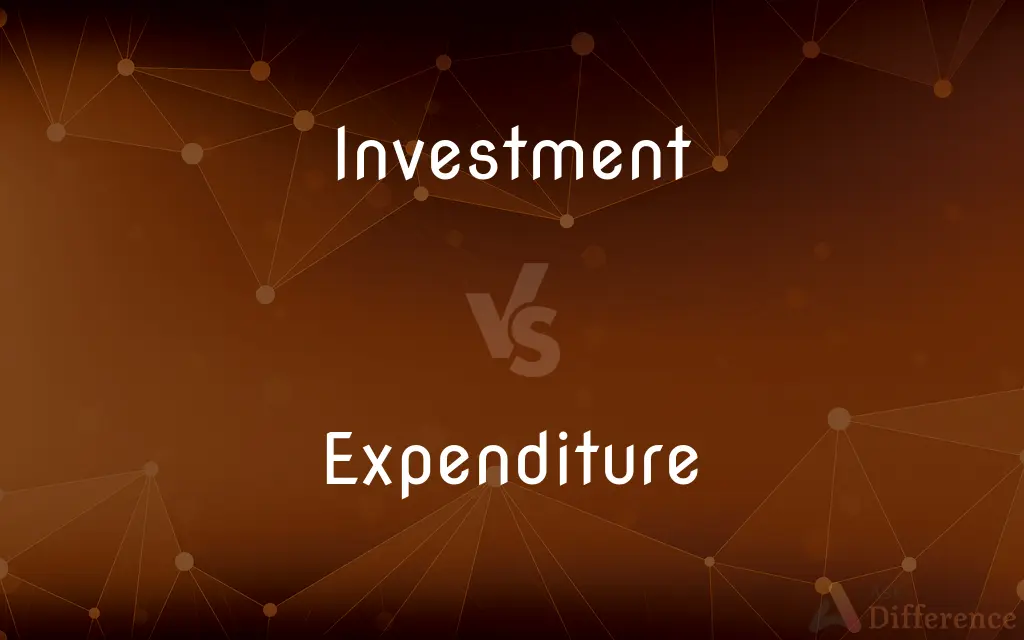Investment vs. Expenditure — What's the Difference?
By Tayyaba Rehman & Fiza Rafique — Updated on October 15, 2023
Investment is the allocation of resources expecting future returns, while expenditure is the act of spending or using resources without necessarily expecting a return.

Difference Between Investment and Expenditure
Table of Contents
ADVERTISEMENT
Key Differences
Investment often refers to the allocation of resources, such as money or time, with the expectation of generating an eventual return or profit. The essence of investment is the anticipation of future benefits. Whether it's investing in stocks, property, or education, the underlying hope is that the initial outlay will be surpassed by the value generated over time.
Expenditure, in contrast, pertains to the act of spending or using up resources. This can be immediate, as in daily expenses, or over time, such as the depreciation of an asset. While expenditure can sometimes yield benefits, it doesn't inherently carry the expectation of a return, as investment does.
It's crucial to understand that while all investments involve expenditure, not all expenditures are investments. For instance, buying stocks in a company is both an investment (expecting future returns) and an expenditure (money is spent). On the other hand, daily living expenses, like grocery shopping, are expenditures without the anticipation of future financial gains.
Moreover, the context in which these terms are used can vary their meanings slightly. For instance, in accounting, capital expenditure (often considered an investment) is distinguished from operational expenditure. However, the core difference remains: investments are forward-looking with expected returns, while expenditures are more about the present outflow of resources.
Comparison Chart
Purpose
Expectation of future returns.
Spending or using resources.
ADVERTISEMENT
Time Perspective
Forward-looking.
Focused on the present.
Returns
Expected to yield benefits.
No inherent expectation of returns.
Nature
Allocative.
Consumptive.
Financial Context
Can increase assets or value.
Often reduces assets or available funds.
Compare with Definitions
Investment
An act of committing money or capital.
The real estate investment multiplied over the decade.
Expenditure
Outlay of resources without immediate returns.
The extravagant wedding led to a massive expenditure.
Investment
Expenditure with the hope of achieving benefits.
The company's investment in research led to innovative products.
Expenditure
Funds used up in conducting activities.
The company had a detailed report of the year's expenditure.
Investment
Allocation of resources for future gains.
Her investment in stocks proved profitable.
Expenditure
Consumption of goods or services.
The project's expenditure was monitored closely.
Investment
A venture with the expectation of a return.
The startup was a risky investment but had high rewards.
Expenditure
The act of spending funds.
The monthly expenditure exceeded the budget.
Investment
The act of investing.
Expenditure
The act or process of expending; outlay.
Investment
An amount invested.
Expenditure
An amount expended.
Investment
Property or another possession acquired for future financial return or benefit.
Expenditure
An expense.
Investment
A commitment, as of time or support.
Expenditure
Act of expending or paying out.
Investment
A military siege.
Expenditure
The amount expended; expense; outlay.
The expenditure of time, money, and political capital on this project has been excessive.
Investment
Investiture.
Expenditure
The act of expending; a laying out, as of money; disbursement.
Our expenditure purchased commerce and conquest.
Investment
A garment; a vestment.
Expenditure
That which is expended or paid out; expense.
The receipts and expenditures of this extensive country.
Investment
An outer covering or layer.
Expenditure
Money paid out
Investment
The act of investing, or state of being invested.
Expenditure
The act of spending money for goods or services
Investment
(finance) A placement of capital in expectation of deriving income or profit from its use or appreciation.
Expenditure
The act of consuming something
Investment
(obsolete) A vestment.
Expenditure
The amount of money spent.
The annual expenditure on maintenance was significant.
Investment
(military) The act of surrounding, blocking up, or besieging by an armed force, or the state of being so surrounded.
Investment
A mixture of silica sand and plaster which, by surrounding a wax pattern, creates a negative mold of the form used for casting, among other metals, bronze.
Investment
The act of investing, or the state of being invested.
Investment
That with which anyone is invested; a vestment.
Whose white investments figure innocence.
Investment
The act of surrounding, blocking up, or besieging by an armed force, or the state of being so surrounded.
The capitulation was signed by the commander of the fort within six days after its investments.
Investment
The laying out of money in the purchase of some species of property; also, the amount of money invested, or that in which money is invested.
Before the investment could be made, a change of the market might render it ineligible.
An investment in ink, paper, and steel pens.
Investment
The act of investing; laying out money or capital in an enterprise with the expectation of profit
Investment
Money that is invested with an expectation of profit
Investment
Outer layer or covering of an organ or part or organism
Investment
The act of putting on robes or vestments
Investment
The ceremonial act of clothing someone in the insignia of an office; the formal promotion of a person to an office or rank
Investment
Purchasing goods for more than immediate consumption.
His investment in rare art pieces was both a passion and strategy.
Common Curiosities
What's a key difference between investment and expenditure?
Investment anticipates future returns, while expenditure focuses on the present spending.
Are all expenditures investments?
No, not all expenditures anticipate future returns.
Can time be considered an investment?
Yes, when spent on tasks expecting future benefits, like learning.
Can a purchase be both an investment and expenditure?
Yes, buying stocks involves spending money (expenditure) and expecting returns (investment).
Is a vacation considered an investment?
Typically an expenditure, but if it improves well-being or business relationships, it can be viewed as an investment.
Is buying a car an investment or expenditure?
Typically an expenditure, as cars depreciate. But if it's for business use generating income, it can be an investment.
Is education an investment or expenditure?
Often seen as an investment due to future benefits, but also an expenditure as resources are spent.
Why is not every expenditure an investment?
Not all expenditures are made with the expectation of future financial returns.
Are all investments expenditures?
Yes, investments involve outlaying resources, making them expenditures.
How does business view capital expenditure?
Often as an investment because it can lead to increased production or efficiency.
What's the risk in confusing expenditure with investment?
One might spend without considering future returns, potentially leading to financial strain.
How should one differentiate between investment and expenditure in daily life?
Consider if the purpose is expecting long-term benefits (investment) or immediate consumption (expenditure).
How do companies treat operational expenditure?
As ongoing costs needed for daily operations, without expecting direct long-term returns.
Are investments always financial?
No, investments can be time, energy, or other resources expecting benefits.
Can an expenditure turn into an investment?
Yes, if it starts yielding unexpected returns or benefits in the future.
Share Your Discovery

Previous Comparison
Polycrystalline vs. Monocrystalline
Next Comparison
Autonomous Investment vs. Induced InvestmentAuthor Spotlight
Written by
Tayyaba RehmanTayyaba Rehman is a distinguished writer, currently serving as a primary contributor to askdifference.com. As a researcher in semantics and etymology, Tayyaba's passion for the complexity of languages and their distinctions has found a perfect home on the platform. Tayyaba delves into the intricacies of language, distinguishing between commonly confused words and phrases, thereby providing clarity for readers worldwide.
Co-written by
Fiza RafiqueFiza Rafique is a skilled content writer at AskDifference.com, where she meticulously refines and enhances written pieces. Drawing from her vast editorial expertise, Fiza ensures clarity, accuracy, and precision in every article. Passionate about language, she continually seeks to elevate the quality of content for readers worldwide.













































